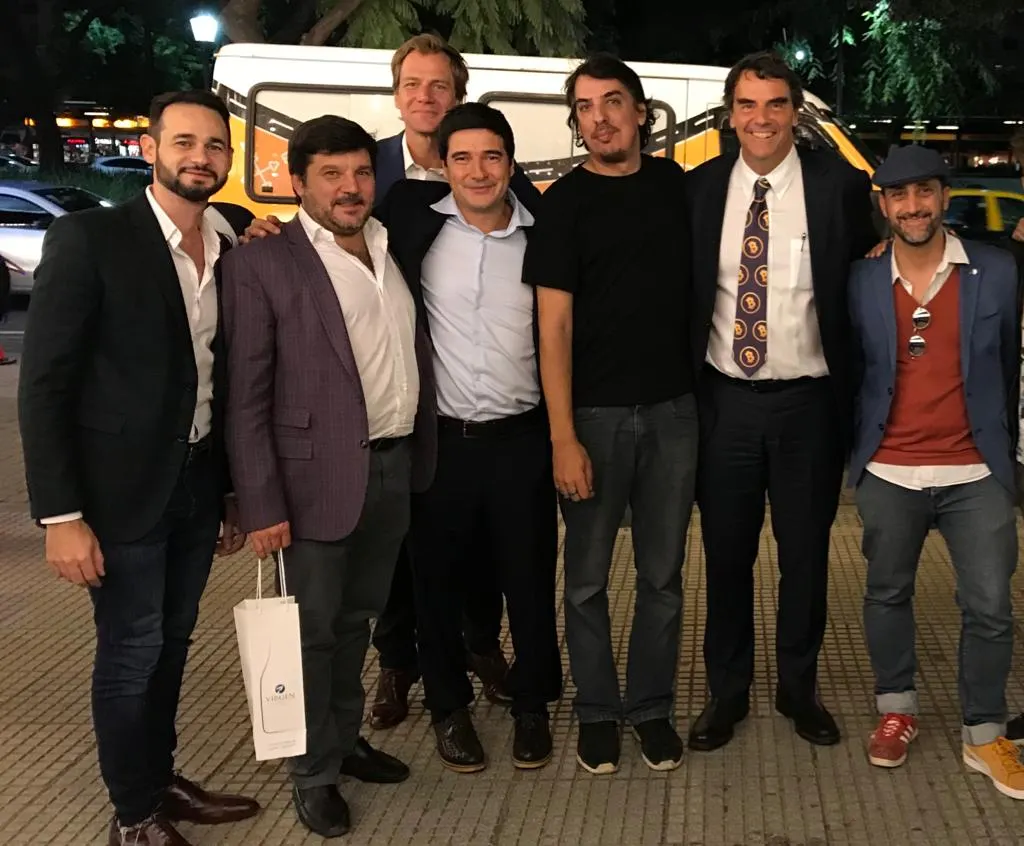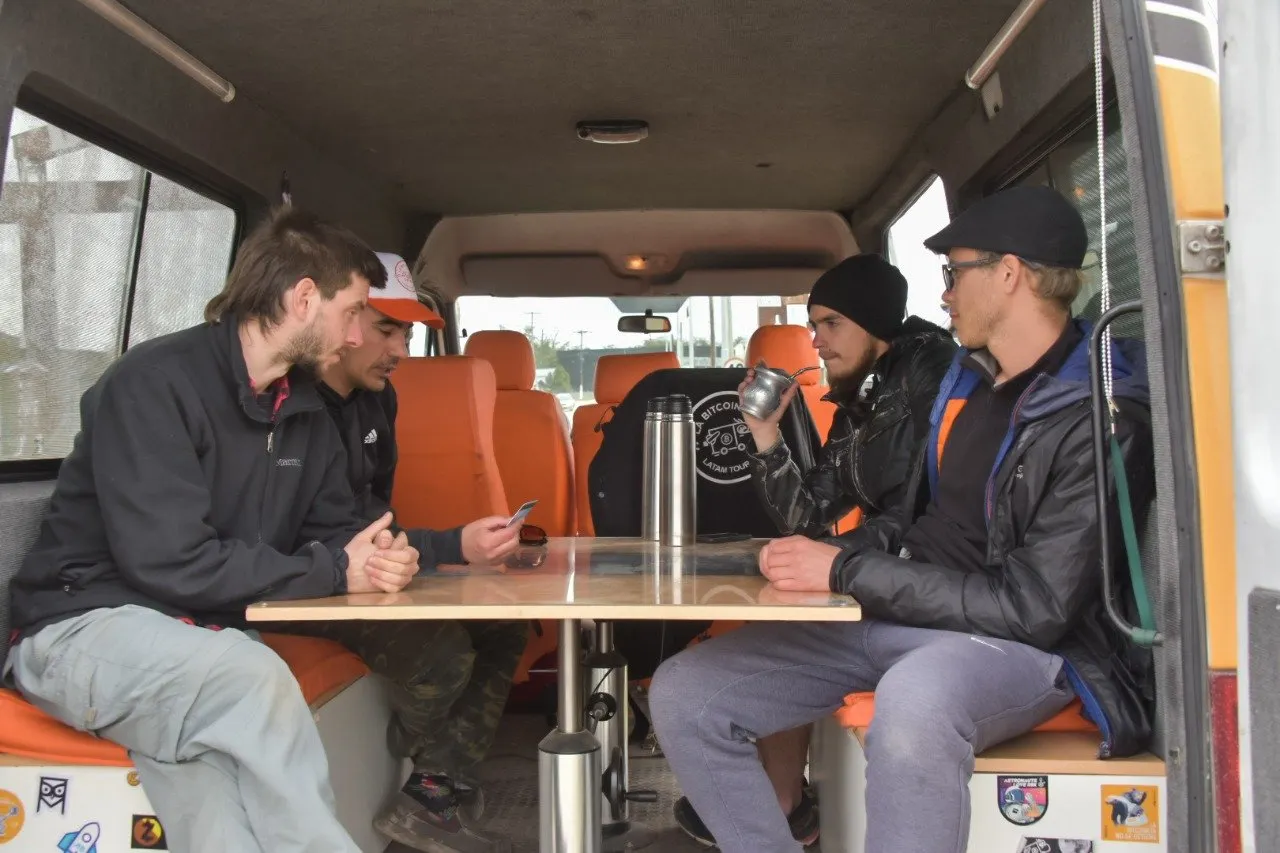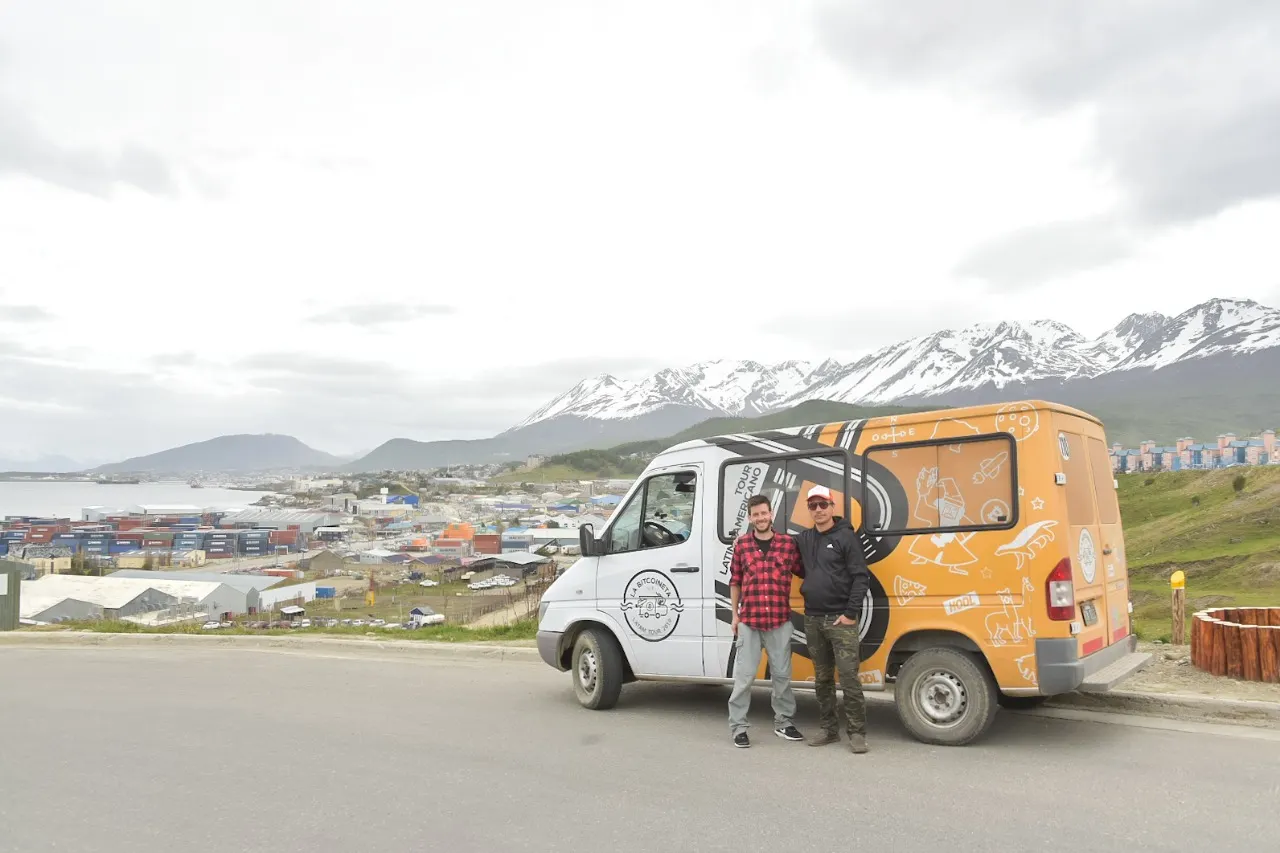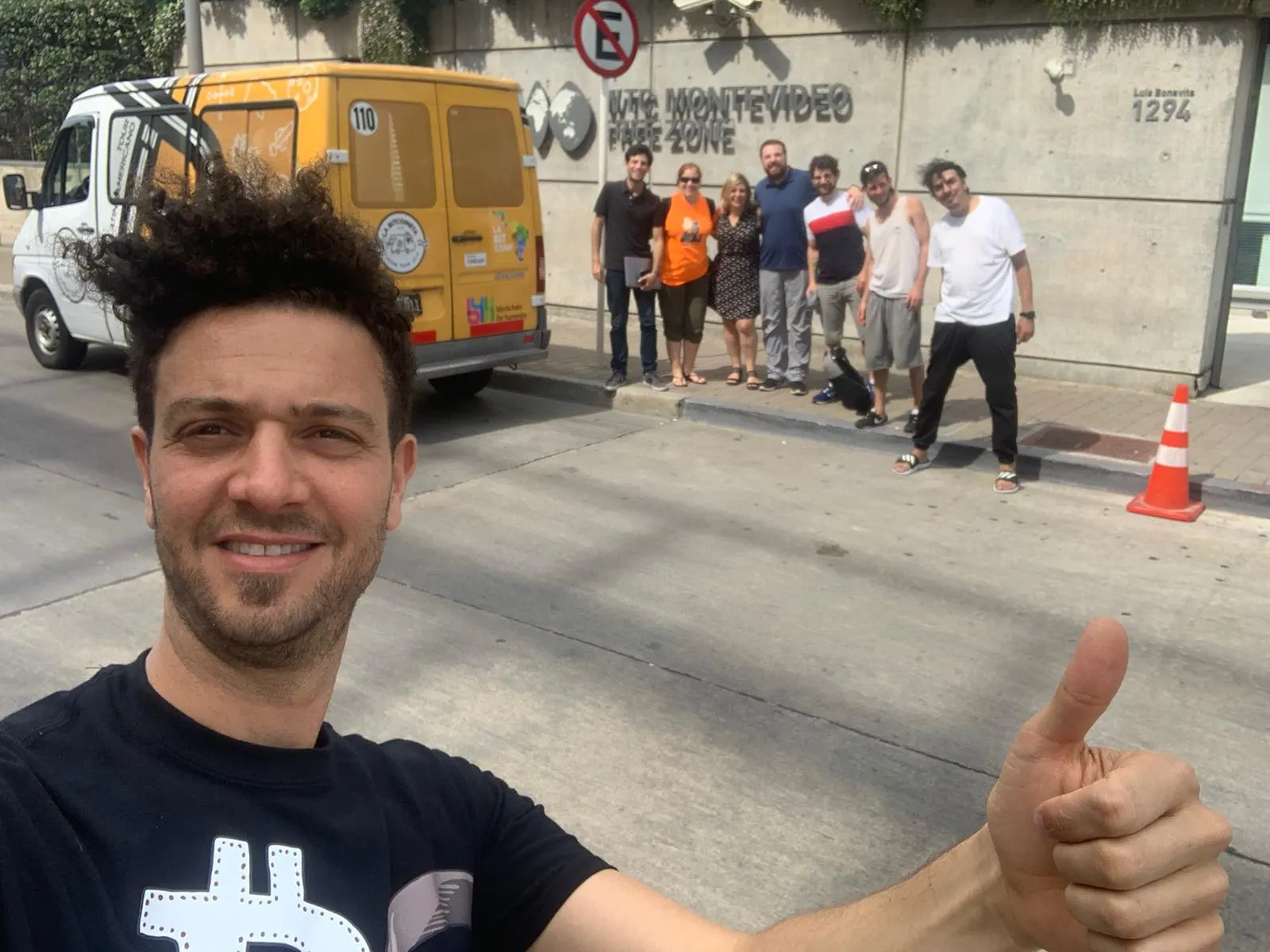In Argentina these days, road travel is far from easy. Protests, or piquete—as they are called, are a daily occurrence.
Demonstrators—railing against governmental policies, unfair local bosses and other ills that beset inflation-struck Argentina—block the roads with burning tyres and barricades, leaving traffic at a standstill for hours.
But even that’s not a wasted opportunity for an interchangeable crew of cryptocurrency enthusiasts, travelling through Latin America on a customized bus called La Bitcoineta.
To date, they’ve covered 22,000 miles, spreading the word about cryptocurrencies and blockchain in over 150 towns and cities across Argentina, Chile, Uruguay, Paraguay and Bolivia. Their enthusiasm is boundless, and the economic difficulties in Argentina and Chile only add to La Bicoineta’s draw.
To the ends of the earth
“Casual encounters are the most interesting thing,” La Bitcoineta’s coordinator, Sebastián “Chevy” Contreras, told Decrypt on a call from Argentina.
“You start talking Bitcoin when you’re on the road, or you do it at the hotel where you’re staying, or you do it at the gas station. It’s not [about] convincing people to buy or use bitcoin, just telling them why we think that this is a solution, or a tool that can help them in a future that’s not so very far away,” he said.
Contreras is one of a core team of 20. La Bitcoineta is now two years old, and is funded by LaBITConf, Latin America's primary Bitcoin event, which kicked off today in Uruguay.

Rodolfo Andragnes, co-founder of not-for-profit Bitcoin Argentina, is one of the key figures behind La Bitcoineta, and many of the social initiatives related to blockchain in the region as well.
The aim, he said, is to reach people in the farthest flung corners of the content; those living in remote regions, with no Internet, and not even a mobile phone signal. More than 50% of Argentina’s population is unbanked, he said.
Andragnes’ interest in Bitcoin goes back to 1997, when he registered the bitcoins.com domain for an e-cash project. “One that was far inferior to Bitcoin,” he emphasized.
He later sold the domain to the now defunct cryptocurrency exchange, Mt. Gox. Buoyed by his good fortune, he started Bitcoin Argentina in 2013.
La Bitcoineta has an annual budget of $30,000 to $50,000 to travel as far as its enthusiasts can, and to reach as many different people as possible, he said. “It’s about getting people motivated about Bitcoin and blockchain, and helping them to start their own, local meetups; to spark an idea,”
People care about this project. We are happy with that. I wouldn't say it's economically successful, but it's not really expected to be.
La Bitcoineta recently visited Ushuaia—a town nicknamed the “End of the World,” thanks to its remote position on the Tierra del Fuego archipelago, the southernmost tip of South America. People had never heard of Bitcoin, says Contreras. And that’s despite living next to Argentina’s biggest mining farm.
The van is now in its second reincarnation. The first Bitcoineta was destroyed in a crash. Fortunately no one was hurt, and a new minivan was soon found.
Another close shave was when La Bitcoineta made a short foray into Bolivia, where cryptocurrency is illegal. “Bolivia has a very difficult situation at this very moment,” said Contreras. The team stayed only two days. And for good reason: the minivan is branded with an unmistakable Bitcoin logo.
Living the Bitcoin life
Inside, La Bitcoineta is equipped with amenities for long periods of travel—plus a projector used to screen educational films out the back of the bus, a Wi-Fi hotspot and a table on which is embedded a full node. The table also converts into a bed.
There’s always a pilot and a co-pilot, but up to five people can travel in the bus at one time. People join La Bitcoineta on a “hop on, hop off” basis, by arrangement, said Andragnes. There’s a waiting list for some trips.
“We try to live by the principles of Bitcoin—the need for ‘don't trust, verify;’ the need for peer-to-peer transactions, talking to people, because you have all this information on the Internet, but you don't even have an Internet connection in some places that we go. “We all think that Bitcoin is something bigger than just money or blockchain,” said Contreras.”

They organise talks and workshops in university auditoriums, at cultural events, in town squares and even local residents’ living rooms. They’re carefully tailored to their audience, which can range from school kids to grannies, and local officials to cattle farmers.
They talk about fundamentals: the uses of bitcoin; its qualities, such as resistance to censorship, but also the challenges facing the cryptocurrency—privacy, prohibitive or restrictive regulation, and scalability.
No one talks about the price. No one cares if bitcoin goes up or down, said Contreras.
Chile, Bariloche and Patagonia
Last week, La Bitcoineta was in Chile. The situation there is critical, said Contreras. A brutal crackdown on protesters against economic upheaval has resulted in a 6pm curfew, and has restricted La Bitcoineta’s activities.
“People are very worried about what’s happening, because Chile was a very wealthy country, it was not prepared,” said Contreras. “Supermarkets have barricades, as if they’re preparing for a raid. It’s very, very sad what is happening in Chile.” He added that they had discovered a “very emerging” bitcoin community.
Before that, La Bitcoineta visited San Carlos de Bariloche, a laid-back mountain town in northern Patagonia which has the biggest ski resort in South America.
Juan Pablo Canepa, who runs a non-profit crypto communications project called Criptoposta, joined the team there. As well as educational outreach, he also helps local businesses to start accepting payment in cryptocurrencies. And has established a “cryptonet” in Bariloche—a network of shops that accept cryptocurrencies as a means of payment.
He spent 20 days travelling on La Bitcoineta, taking in Patagonia and the south of Argentina.

“Every place we went, people were open and eager to learn,” he told Decrypt.
Bitcoin and Litecoin are both popular cryptocurrencies, he said. And some people are interested in the broader technology of blockchain, how it works, and projects like IOTA.
Argentina’s economic incentives for crypto
“In Argentina, prices are rising everyday, so people are looking for alternative solutions for their savings,” said Canepa.
The government has introduced strict controls over the movement of funds, to stem a rapidly worsening financial crisis.
Since 2015, the value of the peso has fallen by over 85% against the dollar. No wonder, then, that Argentinians favor the greenback—or bitcoin.
“People are now reaching for different options, for anything—pretty much—that can be an alternative,” said Canepa. “Anything they can find that works. There’s a lot of uncertainty; a new President. Everyone is speculating a lot.”
Andragnes agreed. He believes that cryptocurrencies are seeing traction again, just as they did during the last government economic crackdown in 2017.
Strict new rules mean wire transfers need explicit authorization, and the government has set a limit for buying US dollars at $200 a month. Cryptocurrencies can’t be bought with a credit card or bank account, so people employ workarounds to get around the restrictions.
But despite its hardline policies, Andragnes said that Argentina’s government is reasonably open to cryptocurrencies, and is looking to enact some form of legislation and standards for trading them.
Contreras said that, while people were keen to learn about workarounds, the La Bitcoineta team encourages locals—from blacksmiths and graphic designers to lawyers and farmers, to accept bitcoin as a means of payment.
Moving towards Montevideo
Right now, La Bitcoineta is at LaBITConf in Montevideo, Uruguay. Outside the capital, people aren’t so interested in cryptocurrencies, said Contreras. “Banks always seem to work, lots of people are employees for the state and they don't seem to need it.” But he added that, in the capital, Montevideo, interest in crypto is growing among a professional community of lawyers and programmers.

Contreras is also a film-maker, and is putting together a movie about Bitcoineta’s travels that’s screening at LaBitconf. A feature length version will be released early next year.
After Uruguay, he thinks La Bitcoineta might make for the Atlantic coast of Argentina for the summer season. Beaches and barbecues beckon.
But what really drives these volunteers is their passion for Bitcoin, and other cryptocurrencies.
“People care about this project. It’s something nice to do. We are happy with that. I wouldn't say it's economically successful, but it's not really expected to be,” said Andragnes.
Contreras concurs: “When you get to a very small town and find a community of twenty bitcoiners, it’s unbelievable. It’s a job, but it’s more like a conviction.”





